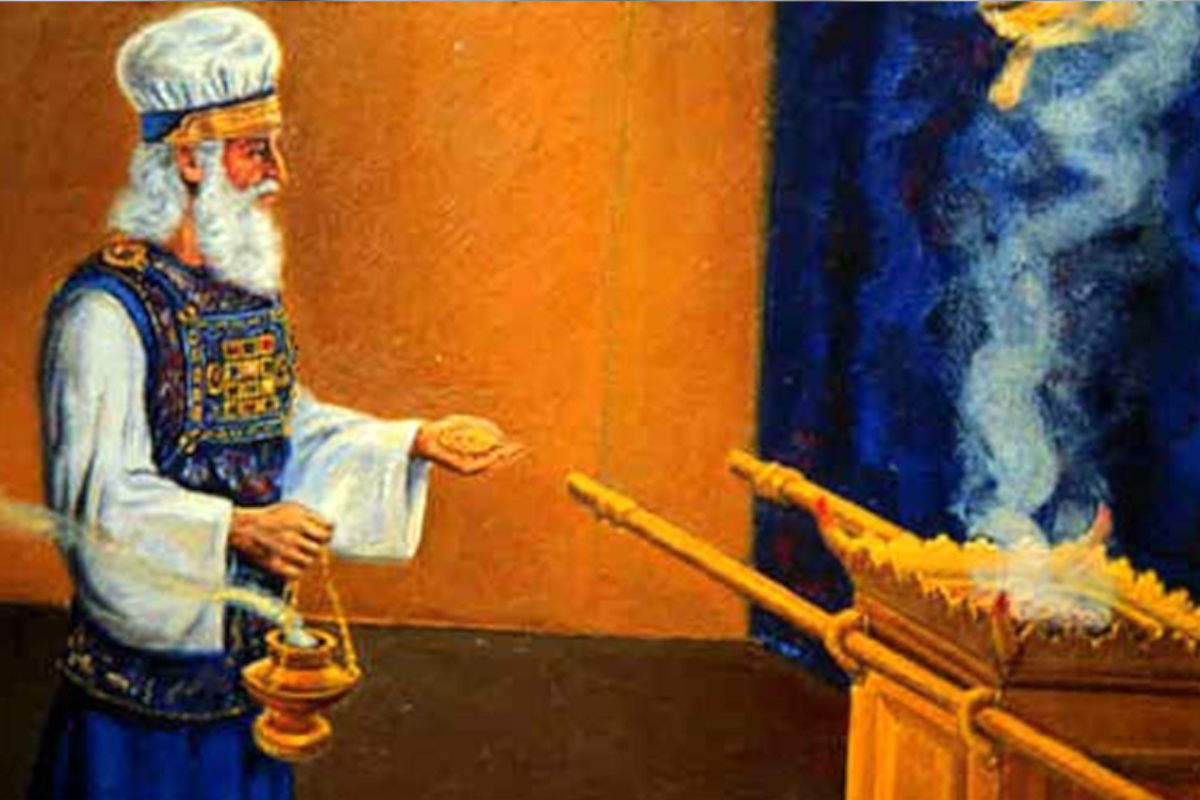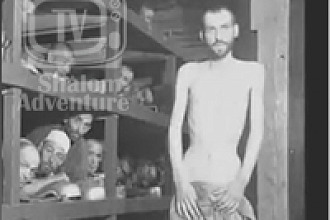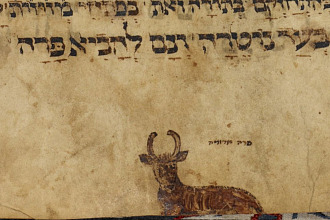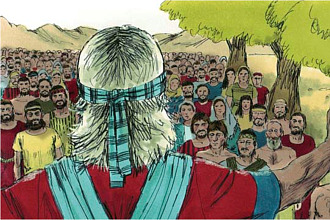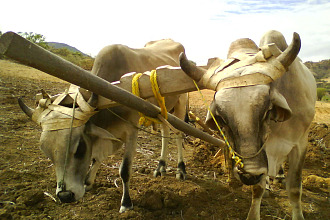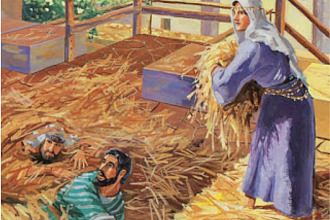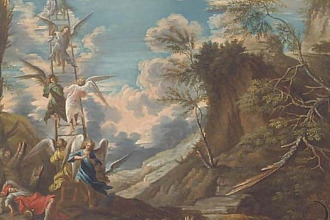Parasha for the Week: Emor: Leviticus 21:1 - 24:22.
Haftarah: Ezekiel 44:15 - 31.
Apostolic Writings: Revelation 1:4 - 6.
Overview:
The Kohanim (priests) are commanded to avoid contact with corpses in order to maintain a high standard of ritual purity.
They may attend the funeral of only their seven closest relatives:
- father,
- mother,
- wife,
- son,
- daughter,
- brother,
- unmarried sister.
The Kohen gadol (High Priest) may not attend the funeral of even his closest relatives.
Certain marital restrictions are placed on the kohanim.
The nation is required to honor the kohanim.
The physical irregularities that invalidate a Kohen from serving in the Temple are listed:
- Terumah, a produce tithe given to the kohanim, may be eaten only by kohanim household.
- Animals must be 8 days old to be sacrificed in the Temple and must be free of any defects.
- Commandment to sanctify the Name of G-d by behavior that is always exemplary,
- and by being willing to die than murder, engage in licentious relations, or worship idols.
The special characteristics of the Shabbat and other holidays are described.
New grain may not be eaten until the omer of barley is offered in the Temple.
The Torah explains the laws of preparing the oil for the menorah and baking the lechem hapanim (Bread of his face) in the Temple.
A man blasphemes G-d and is executed as prescribed in the Torah.
Priests, Sons of Aaron
Among Jews, the book of Leviticus is called Torat Hakohanim: that means the “Law of the Priests.” That is why most of the portion of Leviticus starts saying: “Speak to the priests, the sons of Aaron” (Leviticus 21:1). Moses had to speak to the priests and to explain them that the priesthood derives from their father and later ancestors Aaron. Rabbi Hirsch affirms rightly that “They should recognize and be aware that their priesthood does not come to them on their own merit, but is given to them by birth. Priesthood in the Bible is a task that is assigned to a person at birth, a task to which one is born and for which one is raised, so that in the future it will absorb one’s whole life. Therefore, even as the priests are to view themselves as ‘Sons of Aaron’, so should they view their children as future priests and raise them in and for the duties of their tribe.”
It is interesting to read that the text says “Speak to the priests, the sons of Aaron” because it is the only text in the Torah where this expression is given in this order “the priests, the sons of Aaron”. In other texts it is says “Aaron’s sons, the priests” (Lev 1:5, 8, 11; 2:2; 3:2). Rabbi Hirsch explains that it is because the prohibition given in this portion applies to all Cohanim of pure descent -- even though they have become unfit for the service. That is why everyone who is a descendant of Aaron today, those who bear the family name “Cohen,” respect this law. They don’t walk close to a cemetery or a burial ground even if it is not used anymore, or any place were a corpse could be; this law is still in place even though the temple is destroyed. According to the Bible, one of the most unclean element of this world is a corpse or dead body. That is why it has always been a surprise for me to see that Christians put the corpse of dead person in the church for the memorial service, even more, many Catholic churches have buried their priests or bishops inside their churches. That is impossible for the Jewish people. “Speak to the priests, the sons of Aaron, and say to them, No one shall make himself unclean for the dead among his people” (Leviticus 21:1). Who are the priests of today? John answers this question in the book of Revelation (see the Apostolic Writings commentary).
Biblical Feasts
The feasts are described in this portion of the Torah: ‘These are my appointed feasts, the appointed feasts of the L-rd, which you are to proclaim as sacred assemblies” (Leviticus 23:1–2). The laws of the festivals, which follow the laws concerning the Sanctuary, connect with the laws of the Sanctuary only to the extent that, on each festival, there is a duty to offer a communal offering, for at each festival the Torah requests offering by fire to the L-rd (Leviticus 23:8, 16, 18, 25, 27, 36). But these offering laws are not the main subject of this chapter; the purpose of this chapter is to set the order of the festivals in the annual cycle.
The Festivals are also linked to the Sanctuary by the concept of “Mo’ed” which can be translated as “appointed time” (Lev 23:2, 4, 37, 44). The message of the Sanctuary is that the Sanctuary is the place where you can find G-d and his plan of Salvation. The message of the Feasts is that they are the timing of G-d. The Sanctuary without the Feasts cannot be understood; the Feast without the Sanctuary cannot be understood, and both of them, the Sanctuary and the Feasts must come to us through a divine revelation.
The Shabbat: an appointed time for every 7th day of the week (Lev 23:3). Even though this celebration is listed in Leviticus 23, there is a great difference between the Shabbat and all the other feasts listed here. No sacrifice is mentioned here. Of course they were sacrifices done during the Sabbath, because they were necessary for the forgiveness of Israel every day, but they are not required as they are on the feasts days. This indicate that the Shabbat is not linked to the Temple, even though the Temple is destroyed, the Shabbat which has been given first in Eden (Genesis 2:1-3) is still to be celebrated. Since the Shabbat has been given in Eden, before the sin of Adam and Eve, it has no connection with the Sin, and then does not require any sacrifice. The Shabbat is the celebration of the creation, G-d has created the world in 6 days and rested on the 7th day; that is why he sanctified this day at the time of the creation. On Shabbat we adore our G-d in a special way, to thank him for the creation, and for our existence.
Then the plan of Salvation is developed through the annual cycle of 7 feasts or celebrations.
- Passover: Nissan 14, (Lev 23:5) Its meaning is: Our Salvation comes from the Passover lamb and its blood fulfilled by the death Yeshua.
- Unleavened Bread: Nissan 15-21 (Lev 23:6-8), Its meaning is that Yeshua will stay on his tomb for three days.
- First Fruits: Nissan 16, (Lev 23:9-14), it symbolizes the first spiritual fruits G-d reaped, the resurrection of Yeshua was the first fruit.
- Feast of Weeks, Shavuot: Sivan 6 (Lev 23:15-21), this feast is known as Pen-tecost. It symbolizes the gift of the Torah in Sinai, and by extension all revela-tion of G-d. However on the new Pentecost the gift of the Holy Spirit was given to the disciples of Yeshua. This Ruach Elohim is necessary to understand the Torah and the Bible.
- Feast of the Trumpets, Rosh Hashana: Tishri 1, (Lev 23:23-26). the trumpets were used to call Israel to be prepared for the Judgment, it symbolizes the Second Advent Movement, at the end of time, which in the prophetic time announced the judgment of G-d according to Revelation 14:6-7.
- Day of Atonement, Yom Kippur: Tishri 10 (Lev 23:27-32). The great day of Judgment. The ten days between the Trumpets and Yom Kippur are the time of the investigative judgment; at the end of this period and of the Yom Kippur there will be the second coming of Yeshua.
- Feast of Tabernacles, Sukkot: Tishri 15 (Lev 23:33-36). The tabernacles represent symbolically our heavenly homes were we will be introduced at the second coming of Yeshua and mark the beginning of the eternal peace that Messiah is preparing for us (John 14:1-3).
Haftarah: Ezekiel 44:15 – 31
Haftara: Although through the history of our people we have had lapses in faithfulness, in this hafttara we learn that God always has some who remain faithful to him. "But the . . . descendants of Zadok. . . . faithfully carried out the duties of my sanctuary when the Israelites went astray from me" (Ez. 44:15). It was a great privilege for this family to receive such great approval from God, "They alone are to enter my sanctuary; they alone are to come near my table to minister before me and perform my service" (Ez. 44:16). Then the text reminds of the Priesthood rules:
No priest shall drink wine when he enters the inner court.
They shall not marry a widow, or a divorced woman, but only a virgin.
They shall teach my people the difference between the holy and the common.
They shall show them how to distinguish between the unclean and the clean.
In a controversy they shall act as judges, and they shall decide it according to my judgments.
I am their inheritance; and you shall give them no holding in Israel; I am their holding.
Parasha: In the parasha is chapter 23 of Leviticus which presents the Sabbath and holy days of Israel, including Yom Kippur, "The LORD spoke to Moses, saying: Now, the tenth day of this seventh month is the day of atonement; it shall be a holy convocation for you" (Lev. 23:27).
Haftara: The haftara speaks that way about the priest family because it is a reminder of the various rules and laws given to the priests and of course the rules about Yom Kippur. "On the day he goes into the inner court of the sanctuary to minister in the sanctuary, he is to offer a sin offering for himself" (Ez. 44:27).
Apostolic Writings: Revelation 1:4-6
The Book of Leviticus speaks a lot about Priests, so much, that the Jewish people have called this book Torat Hakohanim (the law of the priests). It is certainly the reason why the English name of this book is Leviticus, word which came from the word “Levy” which was the tribe of the priests.
Thus, a question which can come to our mind is: “What is the value of this book for us, believers in Yeshua, who are members of the new covenant?” In my opinion this book should have a great value for every believer in Yeshua.
This because if it is true that the Temple does not exist anymore in Jerusalem, and then the descendants of Levy and Aaron are not performing anymore their service as Priests. Yeshua has started a new generation of Priests. A new order of Priests. In the Tehilim (Psalms) it is written about another order of Priests, “The L-rd has sworn and will not change his mind, “You are a priest forever after the order of Melchizedek” (Psalms 110:4). This Melchizedek, lived on earth centuries before the tribe of Levy and Aaron (Genesis 14). This Melchizedek lived in Jerusalem, he was the king of Jerusalem, but also Priest in Jerusalem. A very particular position because in the Torah, G-d forbade anyone to get both position priesthood, and royalty. But Melchizedek, was allowed by G-d to have these two positions. Psalms 110 is a messianic prophecy, that means a prophecy which is about the Messiah; that is why the Apostolic Writings (AW) have made this application of Melchizedek to Yeshua: “where Yeshua has gone as a forerunner on our behalf, having become a high priest forever after the order of Melchizedek” (Hebrews 6:20). In this letter of Hebrews, Yeshua is called “priest” or “high Priest” more than twenty times. And the particularity of Yeshua, is that he is also “king” as Melchizedek was king: “for he is L-rd of L-rds and King of kings, and those with him are called and chosen and faithful.” (Revelation 17:14), even more than King, but “King of Kings.”
Yeshua being High Priest of the New Covenant, he has chosen who will be priests in his kingdom: “and made us a kingdom, priests to his G-d and Father, to him be glory and dominion forever and ever. Amen” (Revelation 1:6). He made “us” a kingdom of priests. “Us” means each one of us, who have chosen to believe in Yeshua as our Messiah, our King, our High Priest. And the text of Revelation is not the only one, Shim’on-Peter, calls the believers in Yeshua a “holy priesthood” “As you come to him, a living stone rejected by men but in the sight of G-d chosen and precious, you yourselves like living stones are being built up as a spiritual house, to be a holy priesthood, to offer spiritual sacrifices acceptable to G-d through Yeshua the Messiah” (1 Peter 2:4-5), and in verse 9, he said: “But you are a chosen race, a royal priesthood, a holy nation, a people for his own possession, that you may proclaim the excellencies of him who called you out of darkness into his marvelous light” (1 Peter 2:9). Our service as priests is to “proclaim the excellencies of him who called you out of darkness into his marvelous light.”
Thus if we are priests of the new covenant, and we have to offer a so sacred service to our G-d, the book of Leviticus or Torat Hakohanim, must have something for us. There are two examples from Leviticus.
“And the L-rd spoke to Aaron, saying, “Drink no wine or strong drink, you or your sons with you . . . You are to distinguish between the holy and the common, and between the unclean and the clean, and you are to teach the people of Israel” (Leviticus 10:8). G-d forbade the priests to drink any alcohol when they had to perform their service in the Temple and when they had to teach the people. As priests today, we are performing our service which is to “proclaim the excellencies of him who called you out of darkness into his marvelous light” permanently, we must be ready to teach and to proclaim at any time, thus, according to Leviticus I must not drink alcohol at any time, which is confirmed by Rabbi Shaul “And do not get drunk with wine, for that is debauchery, but be filled with the Spirit” (Ephesians 5:18).
Holiness: “They shall be holy to their G-d and not profane the name of their G-d. For they offer the L-rd’s food offerings, the bread of their G-d; therefore they shall be holy.” (Leviticus 21:6), this order to be holy is also under the pen of Rabbi Shaul: “but as he who called you is holy, you also be holy in all your conduct, since it is written, “You shall be holy, for I am holy.” (1 Peter 1:15-16). Here Peter is quoting Leviticus 11:46. To be holy does not mean to be perfect, but to be set apart for the service of G-d.
Let’s study more the book of Leviticus to understand what our Messiah and our G-d is waiting from us as his chosen people, his royal priesthood, and servants.

